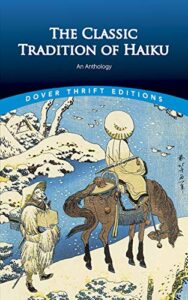 The Classic Tradition of Haiku: An Anthology, by Faubion Bower, provides more insight than I previously had into the tradition of haiku, and I was pleasantly surprised to learn that it’s still a popular form in modern Japanese culture. The introduction also goes into what constitutes haiku. We tend, in the West, to simply think about syllables per line, but that’s not as important as some other aspects that seem more subtle to someone from another culture.
The Classic Tradition of Haiku: An Anthology, by Faubion Bower, provides more insight than I previously had into the tradition of haiku, and I was pleasantly surprised to learn that it’s still a popular form in modern Japanese culture. The introduction also goes into what constitutes haiku. We tend, in the West, to simply think about syllables per line, but that’s not as important as some other aspects that seem more subtle to someone from another culture.
The work of many masters
The collection in this anthology of classic haiku is gathered from the works of traditionally recognized haiku masters from Japanese history, with the original of each first shown in the Japanese language using the Latin alphabet. There are several translators whose work is drawn from, and while most haiku verses included show only one translation, some show the translations from two or more translators. There are extensive footnotes with information about the authors or their subject matter.
This book can be read in many ways, of course, depending on one’s purpose, whether to study the classic form and authors, to see how the Japanese language version may differ from English translations, to learn some of the cultural nuances of haiku, or to simply browse and enjoy the poetry for itself. I got a lot from reading it and intend to enjoy returning to it from time to time. Highly recommended for anyone interested in poetry, or specifically in haiku or Japanese culture.